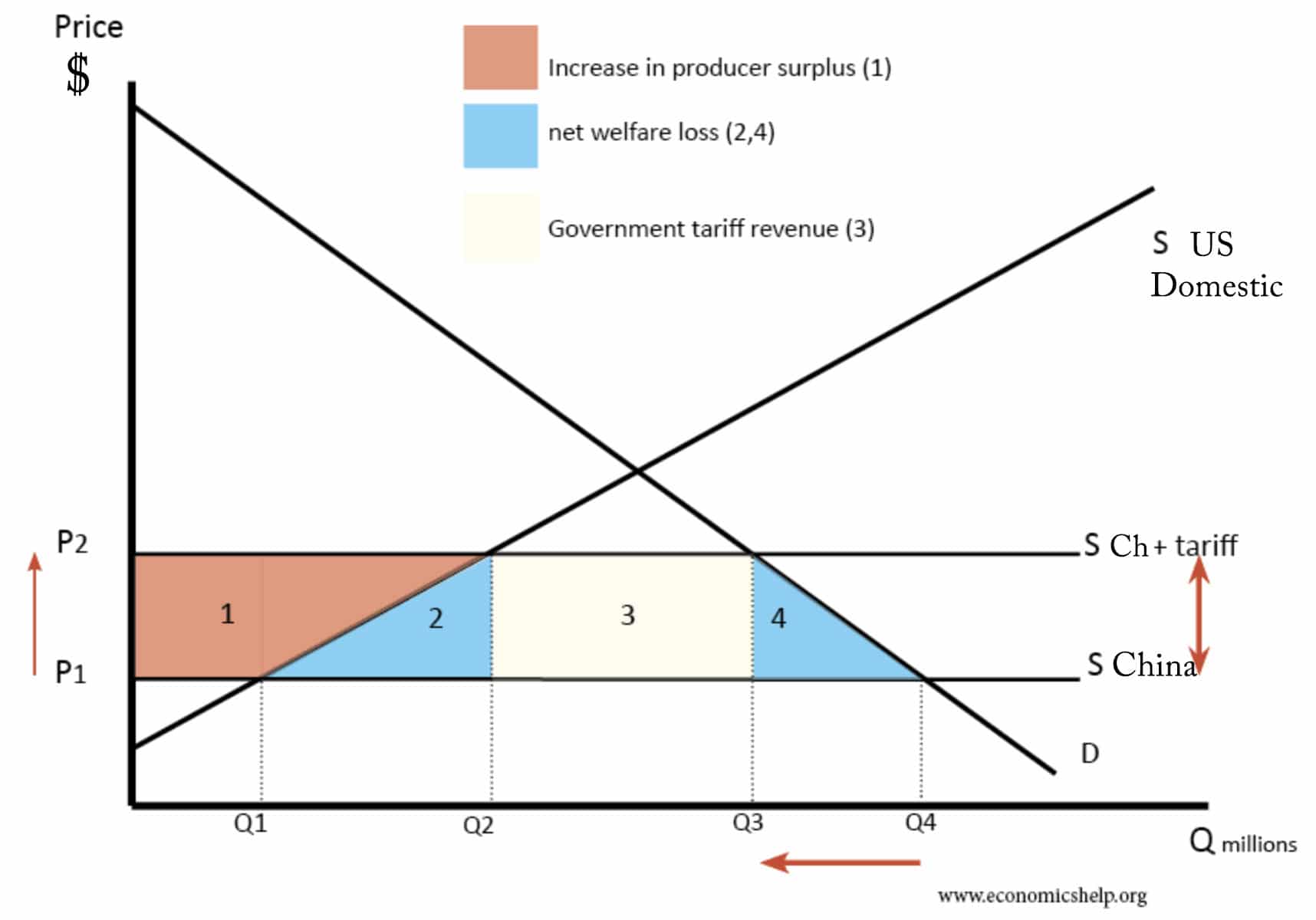The US has recently placed tariffs on Chinese imports and is threatening to further increase tariffs in the next few weeks. The effect of these tariffs is to increase domestic prices, provide some benefits to domestic producers, but also cause costs to US exporters. There is a strong risk that these tariffs will cause loss of economic welfare and in some circumstances could even precipitate an economic downturn.
Whatever you say about the relative merits of these tariffs, it does provide useful tools for teaching the practical application of economics.
Example – US tariffs on imports of washing machines
In 2018, the US placed tariffs on the imports of washing machines, tariffs of mostly 20% – but some up to 50%. The impact of the tariff on imports of washing machines led to:
- Significantly higher prices for consumers (approx 12%)
- Higher profit for domestic US washing machine producers
- Higher tariff revenue for the US government
- Some Increase in domestic employment.
These are all things predicted by economic theory.
This is a diagram to show the effect of US tariffs on Chinese imports

This diagram shows the gain to domestic producers (1) and government tariff revenue (3) It also shows the loss to consumer surplus (1,2,3,4). It leaves a net economic loss of 2+4) – more detail on effect of tariffs.
Washing machines
The price of washing machines rose by 12%. Also, the price of dryers rose 12%. (link) Dryers are a complementary good, not subject to tariffs, but interestingly manufacturers took the tariffs as an opportunity to increase prices for dryers too. This suggests that the market is not very competitive, but dominated by a few large producers. If the market was perfectly competitive we would not expect the price of dryers (which did not have any tariffs to rise)
Producers absorbed some of the tariff increase, but seem to have taken the opportunity to increase the profit margin on washers.
Cost per job created
At first glance, it seems there are several benefits to tariffs
- Higher revenue for the government,
- Ddomestic jobs created,
- Domestic producers making more profit.
However, the key factor is the magnitude of benefits compared to the magnitude of the costs.
There was a 12% increase in prices. There were roughly 10 million washing machines and 7.7 million clothes dryers sold in 2018. Economists predict the net cost of tariff increases for consumers is $1.542 billion per year (Aaron Flaaen, Ali Hortaçsu, and Felix Tintelnot Working paper 2019-61 p.26)
Also, there were an estimated 1,600 jobs created by foreign producers in US production plants. US firm Whirlpool said they hired an extra 200 jobs. Net jobs of 1,800
This means an estimated consumer cost per job of roughly $817,000.
A very expensive way to ‘create; jobs in the US. (This also ignores any jobs lost in US export industries from retaliatory tariffs)
Second round effects
However, the effect of tariffs doesn’t stop at just the impact on imports; there are also other effects to consider.
- Retaliatory tariffs and impact on US exports
- Loss of consumer spending on other goods.
- Uncertainty effects
1. Retaliation by the Chinese government. Higher US import tariffs have led to retaliatory tariffs by China on US exports- notably US agricultural produce. This has caused lower revenue for US farmers and the US government have spent $12 billion on bailing out farmers affected by the trade war.
2. Less consumer spending on other goods. This is one of the ‘hidden’ effects of a trade war. But, if consumers are spending an extra $1.542 billion on washing machines that means they have less disposable income to spend on other consumer goods. Firms will not notice directly, but there will be a loss of domestic sales due to a decline in disposable income from tariffs.
3. Uncertainty. The problem with trade wars is that it can create uncertainty for firms in the global economy. Which tariffs will be increased next? How long will the tariffs remain? Will a trade war cause a fall in consumer confidence? Donald Trump the US president likes to make unexpected, radical decisions that don’t necessarily follow neat conventions. This only increases the uncertainty over the future of trade and economic stability. If the trade war escalates, it may encourage firms to start delaying investment decisions
Evaluation
So far, the trade war has not led to an economic slowdown. It shows that trade is only a relatively small component of aggregate demand. If tariffs are confined to certain industries, it doesn’t necessarily cause a major economic downturn. Also, the US economy is being bolstered by expansionary fiscal policy (higher government spending on military) and low interest rates. A trade war can precipitate an economic downturn, but it is certainly not guaranteed. However, even if the economy continues to grow, it doesn’t mean there are not negative effects. The growth can hide the loss of economic welfare caused by the tariffs.
Related
